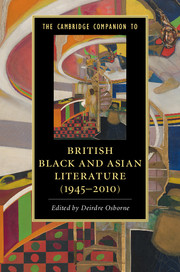Book contents
- Frontmatter
- Dedication
- Contents
- Contributors
- Acknowledgements
- Timeline
- Introduction
- PART I TRACES AND ROUTES
- PART II TRANSLOCATIONS AND TRANSFORMATIONS
- PART III RESTORATIONS AND RENOVATIONS
- PART IV NATIONAL, INTERNATIONAL, TRANSGLOBAL
- 12 ‘Adoption Aesthetics’
- 13 Genre Crossings: Rewriting ‘the Lyric’ in Innovative Black British Poetry
- 14 ‘Other’ Voices and the British Literary Canon
- 15 Critical Outlooks
- Further Reading
- Index
- Series list
15 - Critical Outlooks
from PART IV - NATIONAL, INTERNATIONAL, TRANSGLOBAL
Published online by Cambridge University Press: 05 September 2016
- Frontmatter
- Dedication
- Contents
- Contributors
- Acknowledgements
- Timeline
- Introduction
- PART I TRACES AND ROUTES
- PART II TRANSLOCATIONS AND TRANSFORMATIONS
- PART III RESTORATIONS AND RENOVATIONS
- PART IV NATIONAL, INTERNATIONAL, TRANSGLOBAL
- 12 ‘Adoption Aesthetics’
- 13 Genre Crossings: Rewriting ‘the Lyric’ in Innovative Black British Poetry
- 14 ‘Other’ Voices and the British Literary Canon
- 15 Critical Outlooks
- Further Reading
- Index
- Series list
Summary
Introduction
In the late 1970s and early 1980s, a pivotal generation of black cultural theorists came of age in Britain, opening up both academia and wider public spaces to emergent black voices. Their locus was the Centre for Contemporary Cultural Studies (CCCS), then helmed by Stuart Hall at the University of Birmingham. Most, including Paul Gilroy, Hazel Carby, Kobena Mercer and Claire Alexander, are still active and influential. These cultural theorists have worked in academic spaces but have also been conscious of themselves as writers, part of the wider flow of African-Caribbean and Asian writing in Britain with which this volume is concerned. As black writers, they were among the first to take culture in Britain as the legitimate object of their work; as theorists, they developed a still resonant language for articulating black experiences in Britain, a language that continues to help us understand ‘black Britain’ in the context of wider post-colonial flux. Hall, Gilroy and their peers helped shift the gaze of black British writing because they understood Britain not in terms of migration and exile, but from the standpoint of permanent black presence. They wrote ‘from the inside’, even if their belonging was still contested, and, in doing so, they helped shape the grammar of second- and third-generation black British writing, a grammar that we still speak, and that still speaks for us.
The influence of black British cultural theory endures in the current century regardless of the continued ambivalence of academia towards black thinkers. Over the past three decades it has modelled a consciously disruptive and revisionist role for black writing in Britain, post-war and post-empire. In some senses, attempting to assess the ‘legacy’ of these thinkers feels at odds with cultural theory's own scepticism towards notions of legacy, heritage and tradition. On the other hand, it would be disingenuous to explore critical outlooks at the start of the twenty-first century without acknowledging the pervasive influence of cultural theory on literary criticism. In addition, this chapter also considers current claims that while the influence of black cultural theory persists, there has arguably been a slowing of a certain kind of black critical writing in Britain.
- Type
- Chapter
- Information
- Publisher: Cambridge University PressPrint publication year: 2016

